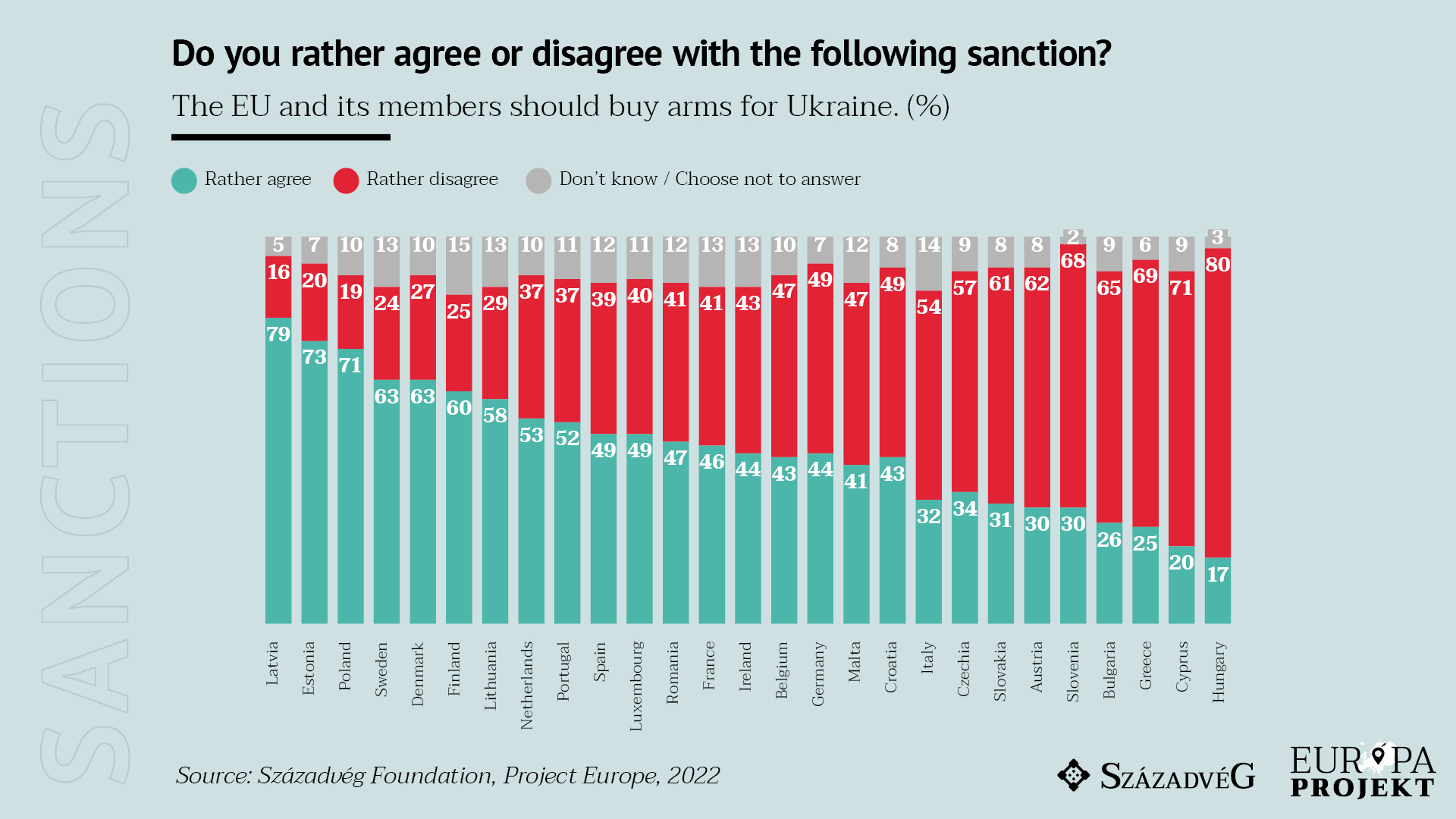The political leadership in several Member States goes against the will of the public
Since the outbreak of the Russian-Ukrainian armed conflict, the issue of arms transfers to Ukraine has played a decisive role in the European public discourse, in addition to the introduction and implementation of punitive measures by Brussels. Based on the research, it can be concluded that in 13 EU Member States, the proportion of those who oppose the arming of Ukraine exceeds the proportion of those who support the move, of which in 9 Member States more than half of the respondents refuse to buy arms. Among others,
80 percent of Hungarians, 69 percent of Greeks, 62 percent of Austrians, and 57 percent of Czechs are opposed to the European Union and its Member States supporting Ukraine by buying arms.
It is important to point out that more than half (57 percent) of those surveyed in Czechia are opposed to European purchase of arms for Kiev, yet the Czech government has sent significant arms shipments to Ukraine. In addition, in Germany, the camp of those opposed to arming Ukraine (49 percent) is 5 percentage points higher than those who support the move (44 percent). At the same time, German Chancellor Olaf Scholz. decided at the end of January that Berlin would transfer 14 tanks to Ukraine. In summary, it can be said that
in several European Union Member States, the decisions of the political elite in the context of the Russian-Ukrainian war do not meet the expectations of the population of their country.
There is a lack of a European consensus on the purchase of arms
We must emphasise that, as with the sanctions in Brussels, European public opinion is significantly divided on the purchase of arms to help increase Ukraine’s military might. The survey reveals that
in 5 EU Member States (Spain, Luxembourg, Romania, France, and Ireland), the proportion of those in favour of buying arms for Ukraine exceeds those opposed to the move, but their share is less than 50% of all respondents.
Interestingly, Spain has already transferred arms to Ukraine and also indicated its willingness to hand over tanks in January, even though less than half of the Spaniards (49 percent) approve of buying arms for Ukraine. Similarly, France would give more tanks to Kiev, in addition to the combat equipment it has provided so far, even though less than half (46 percent) of the French agree to the purchase of arms.
More than half of the respondents in 9 EU Member States (Latvia, Estonia, Poland, Sweden, Denmark, Finland, Lithuania, the Netherlands, and Portugal) support the arming of Ukraine.
The highest proportion of those who agree that the European Union and its members should buy arms for Ukraine is in Latvia (79 per cent), Estonia (73 per cent) and Poland (71 per cent). The result is less surprising since these countries directly border Russia.
In the first half of 2016, the Századvég Foundation conducted a public opinion poll survey covering all 28 European Union Member States, with the aim to analyse the opinions of EU citizens regarding the issues that most affect the future of the EU. In a unique way, Project 28 conducted the widest possible survey of 1,000, that is a total of 28,000 randomly selected adults in each country. Gaining an understanding of society’s sense of prosperity and mapping the population’s attitudes towards the performance of the European Union, the migration crisis and the increasing terrorism were among the most important goals of the analysis. Following the surveys in 2017, 2018 and 2019, on behalf of the government, the Századvég Foundation has been conducting the research under the name of Project Europe since 2020, which continued to reflect on the topics that most dominated the European political and social discourse.
In 2022, the aim of the survey is again to map the population’s attitude towards the most important public issues affecting our continent. In addition to society’s sense of prosperity, the performance of the European Union, the coronavirus pandemic, climate change, and the perception of the migration crisis, in line with the latest challenges affecting Europe, the dominant theme of this year’s poll has been the Russian-Ukrainian war, the energy crisis, energy supply, and family policy. In addition to the European Union Member States, the 2022 research covered the United Kingdom, Norway, Switzerland, Moldova, Albania, Kosovo, North Macedonia, Montenegro, Serbia, Turkey, and Bosnia and Herzegovina, and surveyed a total of 38,000 randomly selected adults using the CATI method between 13 October and 7 December.

